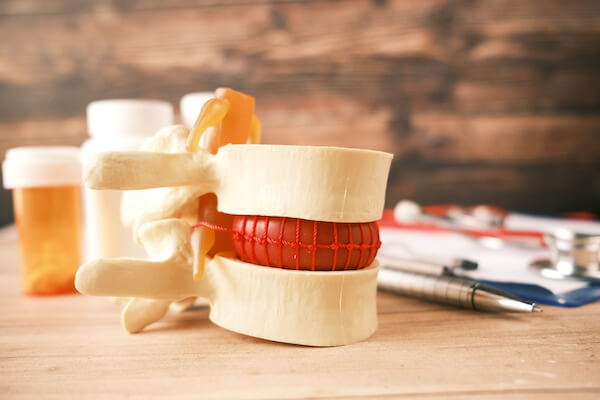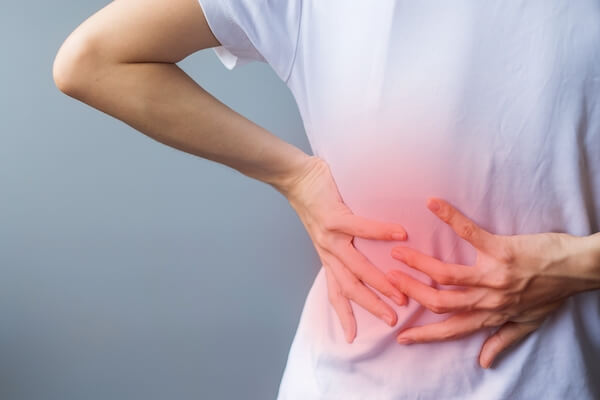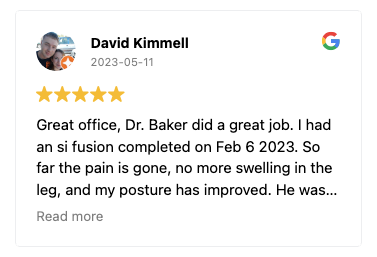Can Dehydration Cause Lower Back Pain?
Back pain is a common ailment that affects countless individuals globally, arising from various causes ranging from muscular strain to more severe conditions such as herniated discs.

One less considered cause is dehydration. Dr. Abdul Baker, a distinguished neurosurgeon based in Texas, specializes in an array of surgical procedures related to the spine and has substantial experience in handling cases related to spinal issues, including those exacerbated by dehydration.
How Dehydration Affects Spinal Discs?
Dehydration occurs when the body loses more fluids than it intakes, impacting various bodily functions and parts, including the spinal discs.

Further Reading & research
The spinal discs are critical components in the spinal column, consisting of an outer ring and a jelly-like substance, acting as cushions between the vertebrae.
Dehydrated Discs are Bad News
When these discs are dehydrated, they are unable to perform their function properly, leading to discomfort and, frequently, pain.
Dr. Baker’s profound knowledge in the field of neurosurgery provides insights into how dehydration affects the spinal discs, leading to back pain, and emphasizes the importance of maintaining proper hydration to ensure the optimal health of the spine and the overall well-being of the human body.
Why keeping Spinal Discs Hydrated is Important?
Dehydrated discs can significantly impact the function of the spine and can be a source of severe back pain. Spinal discs require proper hydration to maintain their structure and function properly.
When discs lose water, they can shrink, reducing the distance between vertebrae and potentially leading to painful conditions like herniated discs.

In a state of dehydration, discs are prone to damage under pressure, exacerbating pain and discomfort in the affected region.
Staying hydrated is paramount; it’s recommended to drink plenty of fluids throughout the day, especially water, to aid in the rehydration of discs and to prevent further dehydration impacts.
Monitoring for signs of dehydration like dark urine can help in maintaining proper hydration levels. Beyond hydration, physical therapy and exercises are also offered, which can be beneficial in strengthening back muscles and improving spine health, thus reducing the pressure exerted on the discs.
For severe cases, more comprehensive treatments and interventions may be explored to restore spinal health, all while emphasizing the importance of maintaining a healthy water intake and staying properly hydrated to avoid recurrence of such issues.
Regular check-ups and consultations with experts like Dr. Baker can lead to personalized advice and treatment plans, based on individual health conditions and lifestyle, ensuring the overall health and well-being of the spine and body.
Clinical Insights into Dehydration and Back Pain
Research has extensively explored the correlation between dehydration and back pain, showcasing the imperative nature of maintaining hydration for optimal spine health.

For instance, studies published in medical journals such as the Spine Journal explain how proper hydration aids in maintaining the jelly-like substance in spinal discs, allowing them to function properly and evade undue pressure and stress, common precursors to back pain.
Although it varies depending on factors such as body weight, the recommended water intake can differ from person to person, but a general guideline is the 8x8 rule, implying eight 8-ounce glasses of water a day.
Some individuals, particularly those who might be exposed to excessive sweating from being involved in strenuous activities or residing in hotter climates, may require more.
Carrying a reusable water bottle can facilitate consistent water intake, encouraging individuals to stay hydrated throughout the day and consume adequate fluids to support optimal functioning of the body, muscles, spinal discs, and overall physiological systems.
Achieving proper hydration is also crucial for maintaining blood pressure and avoiding muscle cramps, emphasizing its importance for the overall health of the human body.
Dehydration can contribute to a condition known as disc desiccation, when you do not drink water then the dehydration can cause spinal discs lose water.
Research institutions and spine health centers have highlighted the detrimental impacts of not maintaining hydration on spinal discs, potentially leading to complications in the spinal column and severe back pain.
Studies conducted by renowned spine institutes emphasize the integral role of hydration in sustaining the health of the spinal cord and the discs situated between the vertebrae, helping in preventing conditions such as herniated discs.
Insufficient water intake and inadequate hydration can result in dehydration, leading the spinal discs to lose water, adversely impacting the health of the spine. Such a scenario could escalate to more serious conditions, highlighting the necessity of regular water consumption and maintaining a balanced fluid intake.
This is vital for intradiscal fluid exchange, ensuring that the discs stay hydrated, maintaining the functionality and health of the spinal column, and avoiding pain caused by pressure exerted on the spinal cord.
Intradiscal fluid exchange is vital to keep the nucleus pulposus—the jelly-like substance in the disc—hydrated, as validated by several studies, allowing the disc to absorb the shocks and stresses experienced by the body, protecting the spinal cord and ensuring the well-being and overall health of the individual.
Ensuring that one is drinking plenty of water throughout the day, along with adherence to medical advice and engaging in physical therapy as needed, supports the preservation of spine health and overall well-being.
Preventative Measures and Hydration
Daily Hydration for Spinal Health
Maintaining optimal hydration is crucial, especially in hotter states like Texas, where the risk of dehydration is high.
For maintaining spine health, proper water intake is essential, as dehydration can lead to dehydrated discs, affecting the spine and possibly causing lower back pain.

It's recommended to carry a reusable water bottle to ensure drinking water throughout the day, enabling discs to stay hydrated, ensuring jelly-like discs between the vertebrae function properly, and maintaining the outer ring of spinal discs. Maintaining hydration levels helps in intradiscal fluid exchange, supporting overall spine health.
Lifestyle Changes to Mitigate Back Pain
Texans’ lifestyles, often characterized by high temperatures and physical activities, necessitate specific habits to prevent back pain.
Regular exercise can help strengthen back muscles and alleviate pressure on the spinal column, potentially reducing pain caused by degenerated or herniated discs.
Maintaining proper body weight and engaging in physical therapy are also essential to address symptoms and protect the spinal cord and the surrounding muscles.
These practices, coupled with adequate drinking of fluids, particularly water, are critical to mitigating pain and fostering overall health.
KEY TAKEAWAYS

Stay Hydrated
Prioritize drinking more water throughout the day, aiming for at least eight 8-ounce glasses, with more if living in hotter climates or engaging in strenuous activities.
This helps discs rehydrate, improving spine health.
Dark urine is a sign of dehydration, indicating the need for increased water intake.
Mind Your Spine
Dehydrated discs can lead to severe discomfort and pain due to the reduction of the jelly-like substance in the discs. Adequate water intake helps maintain proper disc height and alignment, avoiding the spine ends getting closer, reducing the risks of herniated discs between two vertebrae.
Be Physically Active
Regular exercise, including physical therapy, is essential. It strengthens the back muscles, reducing the pressure on the spinal column and helping to prevent conditions like muscle cramps, common symptoms of dehydration.
Seek Expert Advice
Regular consultations with specialists like Dr. Baker can offer personalized advice, treatment plans, and interventions, especially for those experiencing persistent back pain, ensuring that all preventative measures, including lifestyle adjustments and proper hydration, are explored before opting for surgical interventions.
Check Your Intake
Be mindful of how much water you drink. Using a reusable water bottle can facilitate consistent water intake, ensuring that the body and spinal discs receive the necessary fluids. Insufficient water intake leads to dehydration, making the discs lose water and slowly released shocks to the spine, potentially causing an array of health issues, including back pain and making an individual appear an inch shorter due to disc compression.
Balanced Lifestyle
Balancing a healthy lifestyle, including proper body weight, adequate exercise, and proper hydration, is crucial. This holistic approach helps maintain overall health, alleviating pain, and promoting optimal functionality of the body and spine.
Know the Signs
Regularly monitoring signs of dehydration like dark urine and muscle cramps and addressing them promptly by increasing fluid intake can protect spinal health and overall well-being.
Meet Dr Abdul Baker, Back Pain Expert for a Consultation
Dr Baker is a specialist in back pain, including lower back pain, having consulted and treated thousands of patients who show up with issues ranging from crippling pain to moderate flexibility issues.
Whilst he is an expert in robotic surgery and minimally invasive spinal surgery, he always advises exhausting holistic approaches to solving the issue which can include adjusting water intake to ensure people suffering drink the required ounces of water each day so their spinal discs are getting enough water, combined with specialist fitness programs that help build stabilizing muscles in the lower back and physical therapy where required.
For the times that these solutions fail to help the average person, then surgery is sometimes the only option and having an expert like Dr Baker helps ensure that recovery times are minimized whilst the improvements on motion, flexibility, pain and quality of life are maximized.


Dr. Baker specializes in neurosurgery, neurosurgical spine surgery, neurotrauma, brain tumors, spinal tumors, and peripheral nerve damage treatment.









